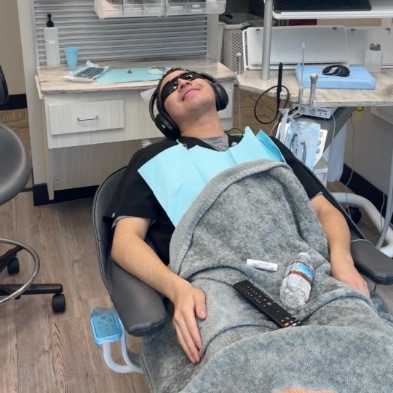Dentures Arlington Heights
Functional and Beautiful Tooth Replacement
If you’ve suffered extensive tooth loss, you may find it difficult to chew food and embarrassing to smile. While there are many options available that may be able to fill in those gaps, dentures in Arlington Heights are among the most popular. This restorative treatment can bring back much of your mouth’s function and appearance, so don’t wait to call us to schedule an appointment at Westgate Dental Care!
Why Choose Westgate Dental Care for Dentures?
- Customized, Natural-Looking Dentures
- Implant Dentures Available
- Precise Digital Impression System
Who’s a Good Candidate for Dentures?

After scheduling a consultation with our team, you’ll come into our office so that we can evaluate your oral health and determine the appropriate approach for replacing your missing teeth. We must verify that your gums are in good shape and your jawbone is sturdy enough to support your restorations. The last thing we want is for you to need replacements prematurely. Our team only uses the best quality material to provide you with durable, comfortable, and natural-looking prosthetic teeth to renew your smile. Read on to learn what makes a good candidate for dentures as well as alternative restorative options you can explore.
Effects of Missing Teeth
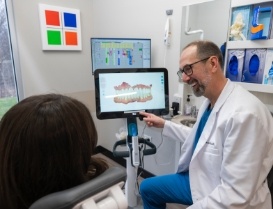
Before starting your treatment process, it’s essential to know what causes missing teeth and why you’ll need to get them replaced. According to the American College of Prosthodontists, some of the typical reasons include tooth decay, gingivitis, accidental trauma, and a poor oral hygiene routine. In some cases, certain systemic conditions can also increase the risk of losing teeth.
If you are missing one or several pearly whites, it’s extremely important to replace them sooner rather than later. If not, you can end up experiencing several negative consequences to your smile. These can involve issues like trouble eating/chewing, difficulty speaking, facial sagging, and reduced self-esteem. More serious effects may include gum recession, nearby teeth shifting to fill in the gap, and jawbone deterioration.
What Qualifies You for Dentures?

Generally speaking, virtually anyone who’s missing teeth can be eligible for dentures. This restorative option is usually ideal for patients who are suffering moderate to drastic tooth loss, as well as those who have sensitive or decayed teeth. However, you must have sufficient, healthy gum tissue and jawbone if you want your restoration to be successful.
The number of pearly whites that you’re missing can also influence the type of denture you’ll receive. Depending on whether you’ve lost one, multiple, or all of your teeth, you’ll be likely to choose from either full, partial, or even implant dentures. These options are typically more cost-effective than other solutions, making them great for those who are on a budget.
Alternative Tooth-Replacement Options
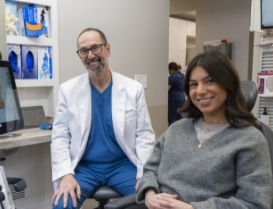
Even if you aren’t eligible for dentures near Palatine, it doesn’t mean you’ll be completely left without a solution. Our team offers alternative tooth replacements, including:
- Dental Bridges – These can be ideal if you’re missing one or several teeth in a row. Your treatment may involve preparing your natural healthy teeth on either side of the gap, but your results can last for 10+ years with proper care.
- Dental Implants – If you’re interested in a more stable foundation for your new teeth, then dental implants might be the optimal choice. These metal posts will be directly embedded into the jawbone, rebuilding the entire tooth structure from the roots up. You’ll need sufficient jawbone density for this treatment to work, and there’ll be a higher upfront cost, but the lifelike results can last several decades to a lifetime with minimal maintenance!
Learn More About Dental Bridges
Learn More About Dental Implants
How Dentures Are Made
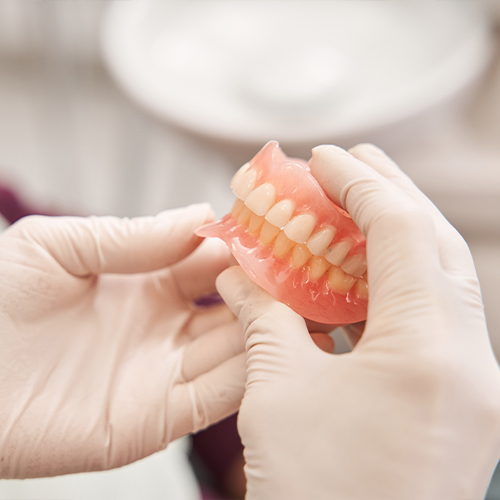
When choosing to receive dentures to replace your missing teeth, you’re likely to have many questions, one of which may be “How are they made?” Knowing the process that is required to make your new teeth will allow you to better understand the time and attention that is necessary to fabricate these carefully crafted prosthetics. It will also help you to appreciate your new smile. Whether it is a partial or full denture that you need, take a few moments to learn about the detailed craftsmanship that goes into making your customized denture.
What Are Dentures Made Of?
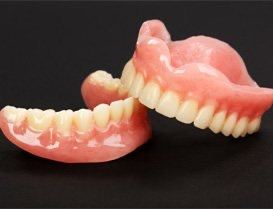
There are two parts to every denture: the base and the artificial teeth. To find out what is involved in creating these two pieces, read on:
- The Base – As the primary structure for your new teeth, the base consists of a gum-colored material that is made from acrylic, porcelain, resin, metal, or nylon. Most commonly, dentists use acrylic because of its ability to mimic natural gum tissue. This is especially true for full dentures. With partials, though, metal clips must be added so that they can attach to natural teeth.
- Artificial Teeth – The artificial teeth that are placed on top of the base are typically made from porcelain or resin because of the natural appearance they possess. Since porcelain is a more frequently used option, it is highly durable, which is a must for most patients.
The Denture Creation Process
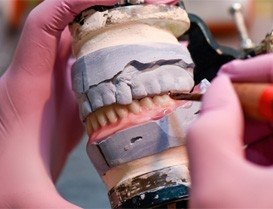
Each denture is custom-made, so no two prosthetics are alike. Because it requires multiple steps before these teeth can be placed inside your mouth, here’s a brief breakdown of the creation process:
- A dentist will take impressions of your gums before a plastic model is created to mimic the mouth.
- The cast is sent to a dental laboratory, where technicians begin to create a wax version for your gumline.
- The artificial teeth that rest on top of the base are set into place, and the technician will make any adjustments by carving the wax.
- Once the wax dentures are sent to our office, you will return for a fitting. Once approved, they will be sent back to the lab so that the process can be completed. The dentures will be boiled down to get rid of any wax before they are placed into a flask. Plaster is then poured in to help maintain the shape of the dentures. It is then placed into hot water to melt the plaster.
- Holes are then created in the teeth so that a liquid separator can be added. Acrylic is injected into the flask so that it replaces the wax.
- After removing the plaster carefully, the denture is revealed, and they’re placed into an ultrasonic bath to remove any plaster.
- After excess acrylic is cut from the denture, it will be given a final polish.
- You will arrive at our office to receive your final fitting and have any final adjustments made before receiving your dentures.
Adjusting to Your New Dentures
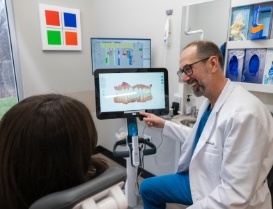
It’s natural for there to be a small bit of discomfort when initially receiving your dentures. While some soreness is normal, you can also expect there to be some difficulty eating and speaking. Fortunately, this is only temporary and will dissipate over time. As you practice saying certain words and eating soft foods, you’ll begin to become more comfortable with your prosthetics. It is also helpful to practice facial muscle exercises so that your mouth becomes more accustomed to your new dentures. However, if you continue to feel discomfort after weeks of practice, don’t hesitate to reach out to our office for help.
Benefits of Dentures

Dentures have evolved throughout the decades to become more comfortable and functional than ever before. In fact, when your prosthesis fits well, it can enable you to enjoy most if not all of your favorite foods without worry. After you get used to wearing your dentures, you may even find that your speech is clearer since the artificial teeth can help you articulate certain sounds. These are just a few of the many benefits of dentures in Arlington Heights, so if you would like to learn more, review the details provided below.
Psychological Benefits

When eyeing a full set of dentures in the mirror, the lack of self-esteem you once had will be no more. Instead, it will be replaced with greater confidence because of how you feel about your appearance. Instead of feeling embarrassed, your mental state will receive a significant boost, allowing you to embrace what you see and feel comfortable sharing it with others. This will, in turn, improve your professional life, as you’ll likely feel more at ease giving presentations or even putting your name in for a promotion.
Clear Enunciation

Missing teeth can leave you unable to speak clearly, which can be a problem when meeting new people, talking in meetings, or simply trying to talk to your grandchildren over the phone. Fortunately, once your new dentures are in place, you’ll feel more confident in your ability to pronounce words and phrases and speak without a lisp. Although the initial days and weeks of wearing a denture can cause a slight speech impediment, it will dissipate over time with practice.
Improves Nutrition

Eating without a full set of teeth often results in malnutrition. You might feel embarrassed trying to consume a juicy steak or cooked vegetables. Instead, you may find that excuses such as “I’m not hungry” are becoming more frequent. Once you have a full set of teeth in place, though, you will be able to enjoy meals with family and friends as well as eat many of your favorite foods. This will help to ensure that your body receives the nutrients it needs to remain in optimal shape.
Preserves Oral Health

When living with an incomplete smile, you may not feel as eager to keep up with your normal teeth cleaning routine. Many patients feel that since most or all of their teeth are gone, there’s no real need to practice good oral hygiene. Unfortunately, this will only lead to more serious problems in the future. But once you have dentures to replace your missing teeth, you can enjoy better oral health that will last for years and years. Not only will you be more likely to brush and floss on a daily basis, but you’ll reduce your risk of gum disease as well.
Expands Opportunity

Dentures can do more than just give you back your ability to eat, speak, and smile. They also serve to expand your opportunities at home and work. Whether you’re a single person who is looking to date again, or you are trying to climb the corporate ladder to reach that promotion you’ve been eyeing for some time, a full smile will do more to help you make a good first impression.
Indications for Dentures
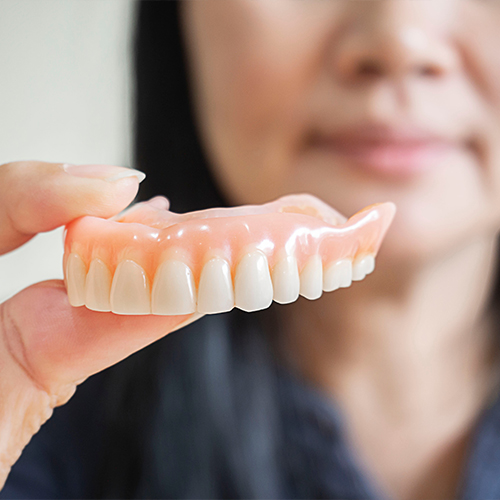
There are basically three types of dentures:
Partial Dentures
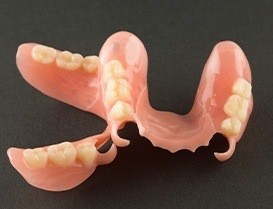
A partial denture consists of a metal framework, attachments, artificial teeth, and a gum-colored base. It is a single prosthesis that replaces multiple missing teeth at different spots throughout an arch. It can help to prevent remaining natural teeth from drifting out of place and provide a more even bite force throughout the mouth.
Full Dentures
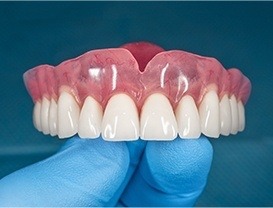
A full denture, as its name implies, replaces an entire arch of teeth. This type of prosthesis has a gum-colored base that is secured in the mouth via natural suction or with the help of a mild adhesive.
Implant Dentures
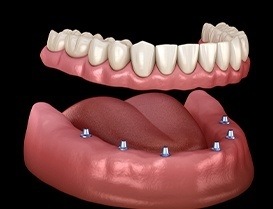
Rather than simply sitting on top of the gums, an implant denture is anchored in the mouth via dental implants in the jaw. It is the sturdiest and longest-lasting type of denture, and it may be either removable or permanently fixed in the mouth.
Understanding the Cost of Dentures

The price of your dentures will vary based on numerous factors, including the number of teeth you’re missing, your oral health, and your desired results. Because no two smiles are the same, the only way to get a precise cost estimate is to visit our office for a consultation. However, we’ve also included some important information on the cost of dentures below. Read on to learn more!
Factors That Affect the Cost of Dentures

Several factors contribute to the overall cost of dentures, including:
- The preparation your smile requires: Any remaining teeth must be extracted for full dentures and preexisting dental issues will need to be treated.
- The type of acrylic used for the base: It’s important that the base of your denture is dyed properly to match the color of your natural gums.
- The material used to create your dentures: Both acrylic and porcelain teeth are common, but porcelain is a bit more durable and may cost more.
Keep in mind that the best option for you may not necessarily be the cheapest. Your smile is something you use constantly, so it’s worth investing in higher-quality materials for stronger teeth.
Are Implant Dentures More Expensive?

Implant dentures cost more than their traditional counterparts, but their superior longevity may make them a better long-term value. Because dental implants can last for an entire lifetime, it’s possible to actually save money from avoided replacements. Dental implants also stimulate your jawbone to prevent it from deteriorating, which means maintaining a fuller, more youthful facial appearance. Above all else, implant dentures give you a smile that looks, feels, and functions just like your natural one.
Does Dental Insurance Cover Dentures?

Yes, most dental insurance plans see dentures as a major procedure and will cover around 50% of treatment, but this will all depend on your specific plan. Our team is happy to contact your insurance provider to speak with them directly so we can confirm your coverage before beginning. We will always do our best to maximize your insurance benefits and save you money. If you have any questions, please don’t hesitate to contact us and speak with one of our friendly staff members.
Other Options for Making Dentures Affordable

No insurance? We have alternative ways of making your dentures as affordable as possible. Our in-house savings plan allows you to access all the dental care you need, plus discounted services for one low annual fee. It features different price points to ensure that you find an option that works for you. We also accept low-to-no-interest financing through CareCredit and have a free new patient special. Committed to cost-effective dentures, we’re sure there is a solution for you. If you’re ready to get started, contact us for a consultation and begin your journey toward a healthy and beautiful set of teeth.
Dentures Aftercare

Proper aftercare is essential for maintaining the comfort, functionality, and longevity of your dentures. To help you out, our team at Westgate Dental Care has compiled valuable tips and guidelines to ensure your prosthetics remain in excellent condition for years to come! From cleaning your dentures to practicing good oral hygiene, we will equip you with the knowledge to keep your dentures looking and feeling their best. With the right aftercare, you can enjoy the benefits of your dentures for as long as possible.
Removable Dentures

Remove After Eating - Maintain the cleanliness of your dentures by removing and rinsing them after every meal. Doing this helps prevent the accumulation of food debris and plaque. Remember to use lukewarm water, as hot water can warp the denture material and compromise the fit.
Clean Your Restoration - You must remove your dentures from your mouth to effectively clean them. Use a soft-bristled toothbrush and a small amount of unscented hand soap, mild dish soap, or denture cleanser to gently brush the prosthetics. Do not use regular toothpaste as it can be abrasive and damage your dentures. If you won't be wearing them immediately, keep them in a container of water or denture-cleansing solution to prevent drying and shape distortion. Rinse them thoroughly before putting them in your mouth to remove any cleaning materials.
Keep Your Dentures Safe - When cleaning your dentures, place a towel underneath them as a precautionary measure in case they accidentally slip from your hands. This can help reduce the chances of damaging your dentures. Also, keep your dentures out of reach of small children and pets to ensure their safety and prevent any potential mishaps.
Remove When You Sleep - Make it a habit to remove your dentures before going to bed at night. Wearing dentures for too long can negatively affect gum circulation, potentially irritating the soft tissues. Sleeping with dentures has been linked to increased risks of pneumonia and higher levels of plaque on the gums and tongue. Prioritize your oral health by giving your gums and dentures a restful night's sleep.
Notice Changes - Watch out for any changes in your oral health, like mouth sores, gum irritation, or signs of infection. If you notice any issues, let us know so we can address them promptly. Similarly, don’t hesitate to contact us if your dentures are shifting, clicking, or displaying signs of poor fit. They may require relining or replacement to ensure optimal comfort and functionality.
All-on-4 Dentures
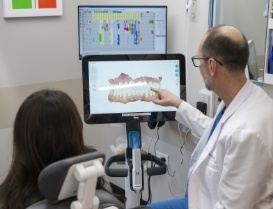
Do you have All-On-4 dentures? You can maintain their cleanliness by brushing them twice a day using a soft-bristled manual or electric toothbrush and non-abrasive toothpaste. Avoid toothpaste with baking soda or stain-removing agents.
Remember to floss your replacement teeth daily, using floss threaders to reach underneath the denture. A water flosser can be a valuable investment for keeping your restoration and implants clean. Consider using sulcus brushes, which are narrower than regular toothbrushes, to effectively clean between your restoration and gums. Additionally, it’s a good idea to incorporate a daily rinse with antibacterial mouthwash to prevent tartar growth.
Denture FAQs
Are you still curious about dentures in Arlington Heights? You’re in the right place! If you have any specific concerns, please don’t hesitate to contact our friendly front desk staff. Until then, we’ve included the answers to some of the most frequently asked questions about dentures so it’s easy to get the information you need. Read on to satisfy your curiosity.
How Long Will You Have to Wait to Get Dentures After Your Teeth are Pulled?
Usually, the average wait time is between 6 to 8 weeks. However, the exact amount of time will depend on the type of denture you need and your specific case. It’s important to give your gums a chance to heal, and this time also ensures that your denture will fit properly.
Immediate dentures can be placed on the same day as your tooth extraction. This is a great option for patients who want a new tooth as soon as possible. You can speak and eat right away, but the shape of your bone and gums may change as you heal.
Can I Sleep with My Dentures?
We generally recommend that you take your dentures out before sleep. When you first get your dentures, we’ll ask you to wear them for 24 hours, however, they should be taken out every night after. This gives your gums a chance to recover and get the nutrients they need during sleep. Taking your dentures out is also important because you must let them soak. This will not only shake loose pesky food debris and plaque, but it will also keep your prosthetic moist, so it doesn’t dry out and change shape.
Will It Hurt to Get Dentures?
Necessary tooth extraction for dentures will cause some soreness and discomfort. This can be managed with prescribed medication, and your pain will decrease after 3 to 5 days. Getting dentures is completely painless, but you may feel some irritation when you first receive your prosthetic – this is just your mouth adjusting to your new smile. The irritation will vary on a case-by-case basis, but the average person needs a few months to get completely adjusted to their dentures. Notably, switching to a new set of dentures may take longer to adjust to.
Is It Hard to Talk with Dentures?
When you first get dentures, there is an adjustment period because you’ll be used to speaking with your natural teeth. The more you practice, the easier it will get to speak with dentures – the time it takes to get fully adjusted will vary from person to person. You may experience a lisp at first, but this will gradually go away as you speak. An easy way to get better at talking with your dentures is to read words aloud that are giving you difficulty. You can also try to slow down your speech so you can clearly pronounce your words.
What Qualifies You for Dentures?
There are three main types of dentures: partial dentures, full dentures, and implant dentures. Each type has specific requirements for eligibility:
- Partial dentures are suitable for people who have most of their natural teeth intact but may have lost a few due to oral disease, malnutrition, or accidental trauma.
- Full dentures are recommended for those who have lost all of their teeth or have minimal healthy teeth remaining that are not worth preserving. Extensive tooth loss can be caused by issues like severe gum disease, advanced oral health problems, or significant bone loss.
- Implant dentures use dental implants to support the denture. Patients must have sufficient jawbone density to support the implants. In cases where jawbone density is lacking, a bone graft procedure can be performed to restore the necessary density.
Determining the appropriate type of denture for your situation requires consultation with our team. We will assess your oral health, jawbone density, and the condition of your teeth to determine the most suitable option for you.
What Can’t You Eat with Dentures?
If you want your dentures to last as long as possible, there are certain foods you should avoid eating. Some of those include:
- Sticky foods like peanut butter and gummy candies have the potential to dislodge your dentures, making them difficult to chew and trapping food particles underneath, irritating the gums.
- Hard foods such as nuts, popcorn, apples, carrot sticks, and corn on the cob should generally be avoided as they can dislodge or harm dentures.
- Tough meats like steak and pork chops require excessive chewing, which can strain both your dentures and gums.
Why Do My Dentures Smell?
Proper denture hygiene is essential to prevent oral health issues and combat bad breath. Bacteria can easily accumulate in the gaps of ill-fitting dentures, leading to gum irritation, sores, and infections that contribute to bad breath. Reduced saliva production in denture wearers further allows harmful bacteria to thrive.
To maintain fresh breath, clean your dentures daily with a soft-bristled brush and specialized cleaner. Remember to brush your entire mouth, including the gums, tongue, cheeks, and palate. Soaking dentures in a disinfecting solution overnight keeps them moist and eliminates bacteria. Additionally, rinsing your dentures after meals removes food particles and prevents bacterial buildup.
Can I Have My Dentures Relined If They Don’t Properly Fit?
Dentures may require relining, repairing, or refitting as they can change over time due to wear and tear, tooth loss, or alterations in the gumline and underlying bone structure.
For sensitive gums, a soft reline is performed, adding cushioning to the dentures to prevent irritation. Soft relines can often be completed in one visit, providing relief to the gums. Meanwhile, extensive changes may require hard relines, which involve sending the dentures to a separate lab. Hard relines offer longer-lasting results and can address significant alterations. If dentures cause mouth sores, a temporary reline is performed to allow the soft tissues to heal.
I Need a Checkup & Cleaning I am Looking for a Dentist for My Child I am Concerned About Bleeding Gums I Have a Cavity or Broken Tooth I am Missing One or More Teeth I am Unhappy with My Smile I am Scared of the Dentist I am in Pain & Need Help I Need My Wisdom Teeth Removed I am Concerned about Sleep Apnea I Would Like to Reduce the Appearance of Fine Lines & Wrinkles View Our Services


